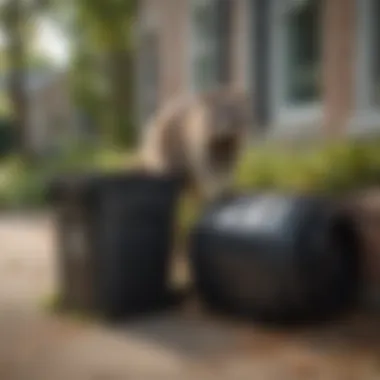Raccoon-Proof Garbage Cans at Home Depot


Intro
Raccoons can be quite a nuisance, especially when they rummage through garbage containers in search of food. Securing waste is not just a matter of cleanliness but also one of protecting your home environment from these clever pests. This guide explores various raccoon-proof garbage cans available at Home Depot, discussing important features, installation tips, and alternative pest control methods.
Pest Identification
Common Household Pests
Before addressing the solutions, it is essential to identify the problem. Raccoons are nocturnal mammals often found in urban areas. They are characterized by their black mask-like facial markings and bushy tails with rings. Additionally, homeowners might encounter other pests like opossums or skunks, which can also create issues with garbage.
Signs of Infestation
The signs of a raccoon infestation are distinct. Homeowners may notice:
- Ripped garbage bags scattered around
- Feces near garbage bins
- Noisy movements at night around the refuse area
Recognizing these signs early can help in taking action before the situation escalates.
Prevention Methods
Environmental Modifications
One of the first steps in preventing raccoons from accessing garbage is making environmental changes. Secure your outdoor area by:
- Installing fencing that is at least four feet high to deter entry.
- Removing food sources nearby, such as pet food or birdseed, that can attract them.
Home Maintenance Tips
Also, focus on maintaining your property effectively:
- Ensure that garbage cans are tightly closed and, if possible, locked.
- Choose locations for bins that are less accessible or obscured from view.
DIY Pest Control Solutions
Natural Remedies
For homeowners inclined toward natural pest control, consider using strong scents that raccoons dislike. For example:
- Vinegar: Placing bowls of vinegar around the garbage area may deter them.
- Essential oils, like peppermint, can also create an unfriendly environment for raccoons.
DIY Traps and Barriers
Creating barriers or traps can also help:
- Installing a heavy cover on garbage bins prevents easy access.
- Using motion-activated lights or pepper spray can startle raccoons and keep them at bay.
Remember, preventing access to garbage is crucial in avoiding encounters with raccoons and other pests.
This comprehensive exploration of raccoon-proof garbage cans and effective waste management strategies directs homeowners in enhancing their properties' safety. By employing thoughtful prevention and control methods, one can protect their home while ensuring cleanliness.
Understanding the Raccoon Problem
Raccoons are more than just adorable intruders rummaging through your trash. They present a significant problem for homeowners, especially in areas where human residences intersect with their natural habitats. Understanding the raccoon problem is crucial not only for the protection of your property but also for the well-being of local wildlife. This section establishes a foundation for why addressing the raccoon issue is vital in managing waste effectively.
Behavior and Habits of Raccoons
Raccoons are intelligent and adaptable creatures. They exhibit behaviors that make them particularly skilled at finding food. Their sharp claws and nimble paws allow them to open containers and access garbage. Raccoons have a "hands-on" approach to feeding, often washing their food in water sources if available, which is why they are sometimes referred to as "masked bandits."


Their nocturnal lifestyle adds another layer of complexity. Raccoons often come out at night to search for food, making it hard for homeowners to notice their activities until it’s too late. They can be quite resourceful, often exploring neighborhoods to locate easy meals, which usually consists of discarded food in trash bins. The knowledge of these behaviors helps homeowners understand the need for specialized garbage solutions.
Reasons for Raccoon Invasions
Raccoons are generally drawn to areas with easy access to food. Several factors contribute to the invasion of raccoons into residential zones:
- Availability of Food: Open garbage cans and pet food left outside are significant attractants. Raccoons can easily smell leftover food from a distance.
- Urban Expansion: As more residential areas are built, the natural habitats of raccoons shrink, forcing them to seek food where it is available.
- Lack of Management: Poor waste management practices can exacerbate the issue, allowing raccoons to exploit easy food sources.
The Importance of Securing Garbage Cans
Garbage cans, though seemingly mundane, play a crucial role in maintaining the cleanliness and health of residential areas. The presence of raccoons adds complexity to this everyday task. Raccoons are intelligent and resourceful creatures, known to raid garbage cans in search of food. Thus, securing these waste containers becomes imperative. This is not only to protect human health and the environment but also to deter unwanted visitors from invading backyards.
Environmental Impact of Raccoon Waste Raiding
Raccoons are omnivorous and scavenging behavior can lead to significant environmental issues. When these animals go through garbage, they often spread waste across yards and streets. This not only creates an unsightly mess but also encourages pests. Moreover, food waste decomposes, leading to odors and the attraction of other wildlife. The aftermath of a raccoon raid can result in further challenges for homeowners, including increased clean-up efforts and potential harm to local ecosystems. Thus, it is clear that managing garbage effectively can mitigate these negative impacts on the environment.
Health Risks Associated with Raccoon Interactions
Raccoons are known carriers of various diseases, such as raccoon roundworm and leptospirosis, which can pose significant health risks to humans and pets. When raccoons rummage through garbage, they can contaminate surrounding areas with these pathogens. This creates a risk for anyone who might accidentally come into contact with contaminated waste or surfaces. In addition to physical health threats, a constant raccoon presence can lead to anxiety or stress for homeowners who worry about their safety or the integrity of their property. Therefore, securing garbage cans is not only a matter of convenience; it is fundamentally about protecting public health and ensuring a safe living environment.
"Securing your garbage cans can lead to a cleaner environment and safeguard your health, preventing raccoons and other pests from invading."
In summary, addressing the issue of garbage can security is essential for homeowners. It has both environmental and health-related implications, underlining the importance of using proper storage solutions to avoid attracting raccoons. Awareness and proactive measures can foster a safer and cleaner living space.
Features of Raccoon-Proof Garbage Cans
Raccoon-proof garbage cans are essential for homeowners facing challenges with wildlife intrusions. Their features help fortify waste disposal, ensuring that the garbage is securely contained. When investing in a raccoon-proof can, understanding the various key elements is important. This section delves into the materials used, locking mechanisms, and size considerations that ensure the effectiveness of these containers in deterring raccoons.
Materials and Durability
The material of a garbage can directly influences its strength and durability. Many raccoon-proof models are constructed from high-density polyethylene or galvanized steel.
- High-Density Polyethylene: This plastic is resistant to impacts and weather conditions. It does not corrode or rust, making it suitable for outdoor use. It has the added benefit of being lightweight, which allows easier movement.
- Galvanized Steel: Often favored for its robustness, galvanized steel is less likely to be compromised by raccoon attempts to dig or pry open the lid. However, it is heavier and may require more effort to maneuver.
The durability of these materials ensures that the can withstands not only animal attempts but also environmental factors such as rain and sun exposure.
Locking Mechanisms and Accessibility
A critical aspect of raccoon-proof garbage cans is the locking mechanism. These can vary widely, but effective designs share common traits that enhance security:
- Latch Systems: These require specific actions to open, preventing raccoons from easily gaining access to the contents. Some models feature clasps that must be lifted or rotated.
- Compression Locks: These provide a higher level of security. They often come with keys or combination codes, deterring not just raccoons but also unwanted human access.
- Child Safety Features: Adding accessibility considerations for homeowners with children is also important. Many modern models include designs enabling easy opening for adults while remaining secure against animals.
Assessable locking mechanisms ensure that while they keep raccoons at bay, they do not overly complicate the disposal process for users.
Size and Capacity Considerations
When selecting a raccoon-proof garbage can, size and capacity must align with your household needs. Factors to assess include:
- Household Size: Larger families will likely need bigger cans to accommodate their waste, while single residents may benefit from more compact options.
- Collection Routine: If waste is picked up weekly, a larger can may be necessary to manage waste effectively without overflow.
- Space Allocation: Consider where the garbage can will be stored. Limited space might dictate more slender or stackable designs.
In summary, understanding the distinct features of raccoon-proof garbage cans can significantly impact waste management strategies for homeowners.
Popular Raccoon-Proof Garbage Cans at Home Depot
Raccoons are notorious for their cleverness and dexterity. They can easily access standard garbage cans, leading to a mess and potential hygiene issues. Therefore, investing in raccoon-proof garbage cans is essential for homeowners. This section focuses on popular options available at Home Depot, exploring why securing waste is crucial and the direct benefits these products offer.
Detailed Overview of Available Options


Home Depot provides a variety of raccoon-proof garbage cans. These options cater to different preferences and budgets. Here are a few popular choices:
- Toter Wheeled Trash Can: Constructed from high-density polyethylene, this can is extremely durable. It features a locking lid that helps prevent raccoons from accessing the contents. It comes in various sizes, making it suitable for various households.
- Rubbermaid Brute Trash Can: Known for its strength, the Rubbermaid Brute features a tight-fitting lid. This can is also easy to maneuver, thanks to its integrated handles. It's designed to withstand animal intrusions while being user-friendly.
- Suncast Commercial Trash Can: This is made from reinforced resin. Its heavy-duty design and automatic locking lid make it a formidable barrier against raccoons. With ample space, it is ideal for larger families or gatherings.
Every option comes with its set of advantages. Features such as size, designing, and locking systems enrich the choice for customers.
Comparison of Different Brands and Models
When considering a raccoon-proof garbage can, it’s essential to evaluate specific characteristics of different models. Here, we compare some aspects of the aforementioned brands:
- Durability: The Toter and Rubbermaid are both designed to last against harsh weather and aggressive wildlife. Suncast also boasts a strong build but might not be as resilient as the others under extreme conditions.
- Locking Mechanism: While all three cans offer effective locking systems, Toter’s lid features a more complex locking mechanism that might deter even the most persistent raccoon.
- Mobility: Rubbermaid stands out in terms of ease of use with its wheeled design. This feature is particularly useful for homeowners who regularly need to transport their garbage cans to collection points.
- Capacity: Suncast typically offers larger options. If you generate a significant amount of waste, this brand may be more suitable for your needs.
In summary, the choice among these popular raccoon-proof garbage cans at Home Depot ultimately depends on individual needs. Evaluating the durability, functionality, and overall design is important to ensure you select a product that effectively secures your waste.
Installation and Maintenance of Raccoon-Proof Cans
The installation and ongoing maintenance of raccoon-proof garbage cans are crucial aspects often overlooked by homeowners. Proper installation ensures that the cans function effectively, while consistent maintenance preserves their integrity. These two elements play a significant role in maximizing the protection of waste from raccoon intrusions. An effective installation reduces the chance of accidental garbage spills, which tend to attract not only raccoons but other pests too. This section delves into the specifics of installing and maintaining these essential waste management tools.
Steps for Proper Installation
A successful installation of raccoon-proof garbage cans requires attention to detail. Here are the steps to ensure optimal placement and setup:
- Choose an Appropriate Location: Select a designated area that is out of direct sight of the raccoons. Avoid spots close to fencing, trees, or any structures that give them easy access.
- Set the Base: If the garbage can does not come with a sturdy base, it helps to place a concrete slab under it. This adds weight and stability.
- Secure the Lid: Ensure the lid fits tightly. Some models provide additional locking mechanisms. If available, use those features to add an extra layer of security.
- Weight Consideration: For extra measure, consider adding weight to the inside of the can. Fill it partially with sand or gravel to prevent it from being easily tipped.
- Regular Checks: After installation, routinely inspect the can to confirm the locking systems and lid are functioning correctly.
Following these steps minimizes the likelihood of raccoons gaining access to the contents, thus contributing to successful waste management in your home.
Regular Maintenance Tips
Maintaining raccoon-proof garbage cans is essential for ensuring their long-term functionality. Here are some maintenance tips to consider:
- Clean Regularly: Ensure that trash cans are emptied often. Food remnants can attract not only raccoons but other pests too. Wipe down the interior to avoid odors.
- Inspect Locks: Periodically check the locking mechanisms for any signs of wear and tear. Promptly replace any damaged parts.
- Seal Cracks: If the can shows signs of wear or cracks, seal them immediately to prevent access. A damaged can may become ineffective against garbage raiders.
- Assess Location: Seasons change, and so do the behaviors of raccoons. Regularly assess your chosen location to ensure it remains effective. Relocating the can may be necessary if you notice increased raccoon activity nearby.
- Educate Your Family: Teach household members about proper usage and care of the cans, including how to secure and close them correctly.
Implementing these maintenance strategies can significantly enhance the lifespan and efficacy of your raccoon-proof garbage can while reducing disturbances from wildlife in your vicinity.
Alternative Solutions for Raccoon Prevention
Raccoons are resourceful creatures, and their knack for rummaging through bins poses a challenge for homeowners. While investing in raccoon-proof garbage cans is a practical step, it is also essential to consider alternative solutions for raccoon prevention. These strategies can assist in minimizing raccoon intrusions and promote a cleaner living environment.
Behavioral Modifications and Area Management
The first line of defense against raccoons involves modifying human behaviors and managing the surrounding area. Homeowners can start by ensuring that garbage cans are not simply placed in visible and accessible locations. Instead, it is advisable to conceal trash bins in garages or sheds when possible. Regularly storing trash indoors can deter these animals from becoming accustomed to a consistent food source.
Furthermore, clean up after outdoor gatherings. Unattended food scraps can lure raccoons into residential yards. Proper disposal of pet food is another measure. Allowing pet food to sit outside overnight encourages raccoons to return.
A well-lit yard can also diminish raccoon visits. Raccoons tend to be shy and avoid brightly lit areas. Motion-sensor lights can make the environment less inviting to them. Additionally, securing compost bins and removing any lingering fruits from trees can limit attractants that draw these critters near.
Use of Repellents and Deterrents
Repellents can serve as an effective solution for raccoon prevention, both in the physical and environmental sense. Homeowners can explore various types of commercial repellents available on the market. These products often emit scents that raccoons find disagreeable, encouraging them to avoid treated areas. It is crucial to apply these products regularly, especially after rain, to maintain their effectiveness.
Natural deterrents can also be beneficial. Strong-smelling items such as cayenne pepper or vinegar can be sprinkled around the garbage can or entry points to property. The unpleasant scent can help keep raccoons at bay. Additionally, using ultrasonic devices designed to emit sounds that disrupt wildlife can help dissuade raccoons from approaching.
Another reputable method involves installing physical barriers. Fencing is a viable option if strategically constructed. Fences should ideally be at least four feet high and buried a foot underground to prevent digging.
"Behavioral adjustments and the use of effective deterrents significantly reduce raccoon encounters. Each small change adds up to make a considerable impact."
Through implementing these behavioral modifications, area management strategies, and effective repellents, homeowners can achieve a more raccoon-resistant environment. By incorporating these methods with raccoon-proof garbage cans, residents can significantly enhance their waste management practices.


Cost Considerations for Raccoon-Proof Options
Understanding the cost implications of investing in raccoon-proof garbage cans is crucial for homeowners. The price varies significantly based on features, materials, and brand reputation. Ensuring effective waste management might seem challenging, but by analyzing the costs associated with these specialized containers, homeowners can make informed financial decisions. It is common to overlook budget constraints when considering pest control solutions. However, considering these costs can yield substantial long-term benefits.
What to Expect in Terms of Pricing
The price range for raccoon-proof garbage cans at Home Depot typically varies from fifty to two hundred dollars. Factors influencing the price include:
- Material Quality: Cans made from high-grade plastic or metal tend to cost more but offer better durability.
- Advanced Features: Cans equipped with smart locking mechanisms or integrated sensors might have a higher price tag.
- Size: Larger models generally come with a steeper price, reflecting their capacity to hold more waste.
On the lower end of the pricing spectrum, there are basic options that might not completely deter raccoons. Higher-end models are designed to withstand animal interferences and often come with warranties, which is a consideration worth evaluating.
Assessing Cost Versus Long-Term Benefits
Investing in raccoon-proof garbage cans should be viewed as a long-term strategy for homeowners. While the initial expenditure may seem significant, the potential savings from reduced waste management issues can offset these costs over time. Here are some benefits to keep in mind:
- Reduced Clean-Up Costs: Fewer incidents of garbage spillage lead to lower clean-up expenses.
- Less Damage to Property: Raccoons can cause damage while trying to access unsecured garbage. Protecting waste prevents potential property repair costs.
- Health Advantages: Avoiding raccoon invasions mitigates health risks related to waste, saving on potential medical expenses.
Investing in a raccoon-proof garbage can may seem like a large upfront cost, but it can save you more in the long run through damage prevention and health-related savings.
When comparing costs, it is wise to also explore reviews and experiences of other customers. Such feedback provides insights into the durability and effectiveness of the chosen product. By conducting thorough research and considering the total cost-benefit ratio, homeowners can make choices that will not only protect their waste but also safeguard their financial interests.
User Experiences and Product Reviews
User experiences and product reviews are critical components in the decision-making process for homeowners looking to obtain raccoon-proof garbage cans. They offer real-life feedback on product performance, allowing potential buyers to gauge efficiency, durability, and practicality. Customer reviews serve as a reliable source of information that goes beyond marketing claims. They reveal the nuances of daily use and how a product performs against the very threats it's designed to counter.
When homeowners evaluate raccoon-proof options at Home Depot, they often seek testimonials that reflect similar living conditions and geographic contexts. This information can be vital in determining not just quality, but also whether a particular model suits specific needs or situations. A raccoon-proof can might boast features like locking mechanisms or reinforced materials, but it's customer feedback that often reveals how well these features hold up in practice.
Evaluating Customer Feedback
Evaluating customer feedback is essential for understanding the effectiveness of raccoon-proof garbage cans. Most reviews focus on durability, ease of use, and whether the product indeed keeps raccoons at bay. Positive reviews often highlight how well a can withstands tampering or bad weather, while negative ones may point out issues like poor locking mechanisms or materials that degrade quickly.
Homeowners should pay special attention to comments that mention ease of cleaning and convenience during daily chores. The effort involved in using these cans should align with modern expectations for usability.
- Key Evaluation Points:
- Durability: How long the can lasts under typical local conditions.
- Locking Mechanism Reliability: Does it genuinely prevent raccoons from opening it?
- Customer Service: Is the company responsive and helpful in addressing complaints?
Case Studies of Successful Implementation
Case studies provide a practical look at how different homeowners successfully implemented raccoon-proof garbage cans in their daily lives. One example can be found in suburban areas where raccoon populations thrive.
Such case studies often include feedback on specific products. For instance, a family using the Suncast 73 Gallon Outdoor Patio Storage Box reported that it completely eliminated raccoon raids after switching from traditional bins. They noted the benefits of its durable design and how easy it was to securely fasten the lid.
Another homeowner in a more rural setting shared their experience with the Rubbermaid Roughneck Trash Can. They emphasized that despite occasional strong winds, the locking mechanism remained secure, preventing any access by local wildlife. Their straightforward account of consistent use demonstrates the importance of investing in quality.
These testimonials serve as practical advice for future buyers. They also help to set realistic expectations, showing others that while no solution is foolproof, a well-chosen raccoon-proof garbage can can significantly reduce the chances of unwanted animal encounters.
Finale: Effective Waste Management Strategies
In a world where urban living increasingly intersects with wildlife, tackling the raccoon problem through effective waste management is essential. Without proper strategies, homeowners may not only face the immediate nuisance of rummaging raccoons but also larger ecological and health concerns. This article underlines the significance of integrating raccoon-proof solutions into daily practices while reinforcing a commitment to sustainable waste disposal.
Integrating Raccoon-Proof Solutions into Daily Practices
Incorporating raccoon-proof solutions involves more than just purchasing a sturdy garbage can. It is about adopting a holistic approach to waste management. Here are some critical practices that homeowners can adopt:
- Secure Placement: Position garbage cans in areas that are less accessible to wildlife. Elevated surfaces or enclosed spaces may help eliminate access.
- Waste Sorting: Segregating waste into food, recyclables, and hazardous materials not only aids in responsible disposal but minimizes attractants for raccoons.
By adhering to these practices, homeowners can truly optimize their waste management systems. They should not rely solely on the equipment but adjust their behavior to complement these solutions. This integrated approach optimizes effectiveness and minimizes conflict with wildlife.
Future Considerations for Homeowners
The landscape of urban wildlife management is evolving, necessitating that homeowners remain vigilant and adaptable. Key considerations include:
- Regulatory Awareness: Local laws regarding waste disposal and wildlife interactions may change. Being informed ensures compliance and enhances community safety.
- Community Engagement: Collaborating with neighbors can lead to shared knowledge and resources. Community clean-up events or educational initiatives regarding wildlife can be beneficial.
It is paramount for homeowners to recognize that the challenge of raccoon invasions is an ongoing process. By staying proactive and considering future changes, they can protect not only their property but also the broader environment.















